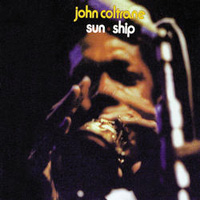 John Coltrane Recorded about eight months after A Love Supreme, Sun Ship shows Coltrane working toward the close of the "classic quartet" period with a collection of five songs informed by the deep spirituality of Coltrane's earlier masterpiece, but played with the smoke and fire of the later quartet with Alice Coltrane and Rashied Ali. This was to be the last proper album by the quartet that featured McCoy Tyner, Jimmy Garrison, and Elvin Jones, although Meditations featured all four, but added Ali as a second drummer. The quartet made a stab at Meditations without the second drummer (a session released as First Meditations and also available in the Classic Quartet box), and that was to be their last attempt at a studio album together, so Sun Ship stands as the "official" end of the classic Coltrane group. At this point, the group was already significantly far away from the bluesy post-bop of Coltrane's late 50s and early 60s albums, and inextricably far down the path of Coltrane's "New Thing" sound (a marketing term, really, but what else to call it?). The band plays furiously and Coltrane unleashes blistering sheets of sound, wringing every possible melodic and rhythmic idea from the tiniest assortment of notes and chords. It's said that Coltrane would sometimes just come in with a couple of notes in mind, and the band would play entire fourteen-minute long songs around the notes – not that you would ever sense the unrehearsed quality to these compositions. The beginning of "Dearly Beloved" on Sun Ship even features a tiny bit of studio banter where Coltrane merely directs the quartet to "keep a thing going" and then they immediately launch into this amazing, beautiful song. It's a great moment that also lets us in on the wonderful lack of premeditation involved in the creation of Coltrane's later music. They call it the "post-classic" period in the liner notes, but I wonder which was the real "classic" period. Perhaps it was all classic, from the youthful bebop stuff all the way to the fiery minimalism of the last recordings. Miles Davis gets a lot of credit for producing great records in a variety of jazz styles, but I'd say that he can't hold a candle to the overall quality of Coltrane's output, which furthermore is more expressive and inventive to boot. Then again, we don't have an early-80s Coltrane album to dilute the mythos – Coltrane going smooth on a cover of Howard Jones' "No One is To Blame," perhaps? It's really difficult to imagine where he might have gone had he not died in 1967, right before fusion and literally at the end of his musical/spiritual quest. It's hard to think anything but that Coltrane was called to his God after completing his assignment. The music had been deconstructed so completely at the end, where could it have gone? Can you imagine a CTI Coltrane album? Coltrane and Patti Austin, together at last? The man is a musical John Henry; it's impossible to imagine his life turning out any other way. And we still puzzle over what he left behind – probably a good thing he wans't allowed to leave more for us to tear apart and argue about. Truly a shame that not more was left behind for us to enjoy, but then we have albums like Sun Ship. Coltrane plays tenor throughout, and it's beyond intense. Tyner provides aggressive support, Elvin runs on 150% possible human strength, and Garrison manages to keep things reined in even when they get farrrrrrr out. At one point in "Amen" we're bombarded with literally every single quarter note by Jones and Tyner, while Coltrane flies over the top like a mixture of the most beautiful swan and the most ridiculous honking goose. It's quite the opposite of an album like Time Out, although its ferocious hardness is impossible not to feel as sincere and good. Coltrane is honesty, and this is honest music without embarrassment. Unlike, say, Jewel. Highly recommended, a decidedly major milestone in the Coltrane canon. It's not going to make sense to everyone, and probably wouldn't be the best place to "get into Coltrane," but save it and savor it when you get to it. Look forward to "Ascension" with Garrison's amazing (and long) bass solo leading to the quartet's impossibly perfect final statement. This wasn't the actual last stand of the classic quartet, but it was in many ways their swan song. Damn near perfect, wonderful, beautiful music. Oh, see, I've wet myself.
Review by Wimpempy Tarlisle |